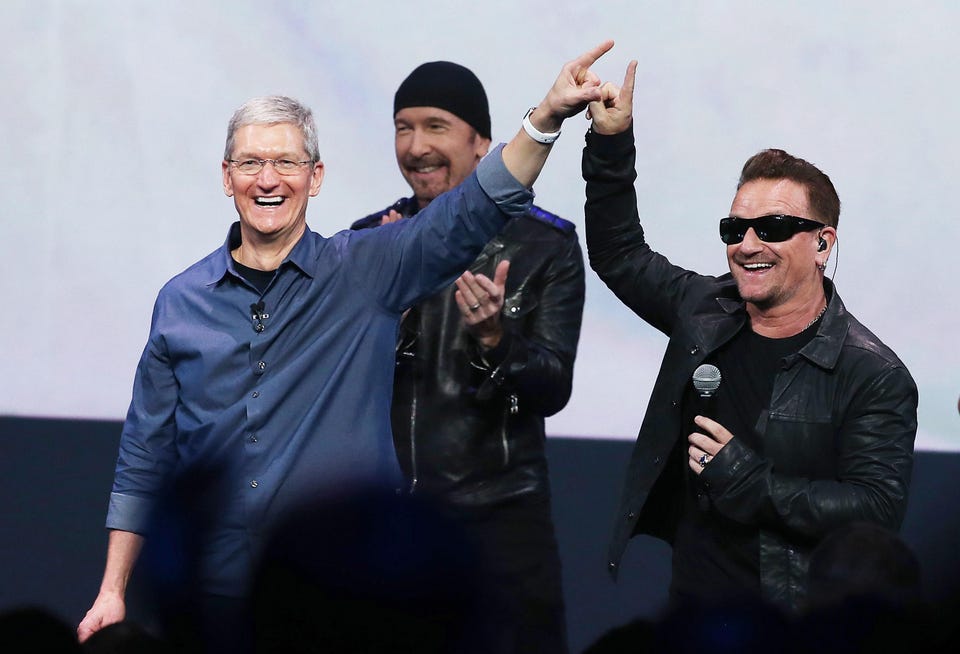Consumer Tech How Apple And U2 Made An Unforgettable Blunder, And Whose Fault It Was David Phelan Senior Contributor Opinions expressed by Forbes Contributors are their own. I write about lifestyle tech Following New! Follow this author to stay notified about their latest stories. Got it! Oct 30, 2022, 01:37pm EDT | New! Click on the conversation bubble to join the conversation Got it! Share to Facebook Share to Twitter Share to Linkedin CUPERTINO, CA – SEPTEMBER 09: Apple CEO Tim Cook (L) greets the crowd with U2 singer Bono (R) as .
. . [+] The Edge looks on during an Apple special event at the Flint Center for the Performing Arts on September 9, 2014 in Cupertino, California.
Apple unveiled the Apple Watch wearable tech and two new iPhones, the iPhone 6 and iPhone 6 Plus. (Photo by Justin Sullivan/Getty Images) Getty Images Like some free music? The answer you give may not be the resounding yes that Bono was hoping for in 2014. That was when the frontman of U2 joined Apple CEO on stage during the keynote that also saw the iPhone 6 unveiled.
More than that, it went on to be one of Apple’s biggest bloomers, alongside the unprepossessing launch of Apple Maps and that puck-shaped Mac mouse. MORE FROM FORBES Forget The 2022 Apple iPad Pro: New Leak Predicts Stunning Upgrade By David Phelan The incident has just crept back into the public consciousness because Bono’s memoir, “Surrender: 40 Songs, One Story”, is about to be published. The 2014 album, called Songs of Innocence, would be available to all iTunes store users, it was announced.
Cool, huh? After all, this was before the days of Apple Music, where your monthly subscription provides 100 million albums at your disposal. In those days, you bought each album or track separately. Even so, it’s quite nice to choose which music you own, I’d say.
And many people noticed that the album was automatically downloaded without them asking for it. Which meant it sat there, taking up space in each user’s iTunes library. And if you’re not a U2 fan, you might find this a rather annoying deployment.
MORE FOR YOU The Inside Story Of Papa John’s Toxic Culture Historical Insight: Mortgage Rate Moves Are Independent And Can Turn Quickly 3 New Non-Alcoholic Products To Try This October Since there were 500 million people with iTunes accounts at the time, it was bound to annoy quite a lot of people. So what, you might say? Surely it’s not that hard to delete an album, is it? Except in this case, it seemed impossible to delete. As users reported at the time, there was an option to hide it in iTunes but not remove it.
This escapade is what I’d call a reverse Orwell. By this I’m referring to another digital debacle, this time concerning Amazon in July 2009 and an unauthorized removal from, rather than an installation in, customers’ devices. Without warning, Amazon remotely deleted some digital editions of George Orwell’s Animal Farm from the Kindles of users who had bought the book.
With an extra helping of Irony with a capital I, it also took away some copies of Orwell’s masterpiece, 1984. Given that book’s themes of state-governed thought control, and the origination of Big Brother, the piquancy of this moment is hard to resist. Amazon did it, by the way, because it discovered it had sold digital copies of these books by a company which did not have the rights to them, and quickly apologized for what it said wasn’t a great response.
But what was Apple to do? On September 15, 2014, it offered a tool to remove the album, laden with the warning that once removed, you can no longer change your mind and redownload it as a previous purchase. U2’s album had massive, instant download numbers, doubtless record-breaking. But it likely also held another record for the album deleted in bigger numbers and in a shorter time than any album before or since.
And surely there’s the distinction of being the only album for which Apple created a dedicated delete button. If there are red faces, Bono says in his memoir that the blushes should just have been his: “I take full responsibility. Not Guy O, not Edge, not Adam, not Larry, not Tim Cook, not Eddy Cue.
I’d thought if we could just put our music within reach of people, they might choose to reach out toward it. Not quite. As one social media wisecracker put it, ‘Woke up this morning to find Bono in my kitchen, drinking my coffee, wearing my dressing gown, reading my paper.
’ Or, less kind, ‘The free U2 album is overpriced. ’ Mea culpa. ” Mind you, we’ve all made terrible music choices, surely.
Which makes me wonder, maybe we should wish Apple had performed this trick more often. So, when a friend said, “I can’t believe that terrible song is in your playlist,” you could reply, “Oh, no, I didn’t choose it. Apple made me have it.
” On second thought, maybe not. David Phelan Editorial Standards Print Reprints & Permissions.
From: forbes
URL: https://www.forbes.com/sites/davidphelan/2022/10/30/how-apple-and-u2-made-an-unforgettable-blunder-and-whose-fault-it-was/



